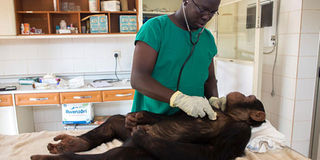New chimpanzee sanctuary boss speaks out on his plans

Sanctuary. Dr Joshua Rukundo treats a chimpanzee recently. PHOTO BY INNOCENT AMPEIRE
What you need to know:
- Interview. Dr Joshua Rukundo has been confirmed as the executive director of Ngamba Chimpanzee Sanctuary and Wildlife Conservation Trust, after a year in acting capacity. Edgar R. Batte sat him down for a chat about his plans and conservation ideals.
You have been acting as executive director (ED) of Ngamba Chimpanzee Sanctuary, what has the journey been like?
It has been a journey of learning and growth. I have been familiar with the operations of the Trust for nearly seven years now.
I have also been dealing directly with some of our regular donors and supporters, as part of our internal succession planning implementation, across all critical positions.
My former boss Lilly [Ajarova] was helpful in making the necessary connection and introduction and over the past year, has also helped to advise when approached.
My colleagues have also been especially helpful.
Since I have worked with the team as the operations director, we have a good working relationship and I have received their support, 100 per cent. This helped really a lot.
What is on your wish list in terms of steering the sanctuary?
I would wish for the Trust to achieve self-sustainability in the next four years. This is by all means a tall order and rather ambitious, but nonetheless, my wish.
I hope to grow the tourism business in tandem with (or better than) the national growth, with Ngamba Island as a unique and a niche destination.
I hope to work with my team and stakeholders to build the brand of Ngamba and drive more numbers, especially the nationals, towards tourism on Lake Victoria and Ngamba.
Your volunteering stint at Uganda Wildlife Education Centre (UWEC) triggered your primate connection. Tell me about that motivation…
As a vacist many years ago, I looked for a gig that would feed my desire to work with animals. At the time, it was unusual and so I kept it to myself, until I came to Ms Beti Kamya’s office [then UWEC boss] and asked if I could volunteer.
She was warm and welcoming and I was assigned to the keepers in the animal section.
I worked with keepers like Julius Abigaba, Alex Droma, and Opio, among others. I enjoyed my time at UWEC though I remember I was not allowed into the chimp house, as this was a ‘special’ place for only the ‘special keepers.
The closest I came to it was once when Dr Josephine Afema had to administer some medication and I was asked along as the keeper to assist.
So for long, I looked at the chimps as special animals and was always in awe.
It is no wonder, I jumped at the opportunity to come to Ngamba several years later when it came.
You are running a fund with a target of $1.3m (Shs4.8b). How much of the contribution so far has come from young people, and how are you drawing them towards tourism?
Young people have given, but mostly from international donors. I do hope that one day, the economy of Uganda shall develop to a level to allow Ugandans to give to their own charities.
Tourism is one of the engines that shall drive the economy to such heights.
At Ngamba, we are working to redesign our product to attract and engage with Uganda at all levels, especially the youth. Our education programme has worked with the youth to develop dramas for conservation education and soon also with urban schools for tourism education.
How do you tie conservation in the experience for a tourist to the sanctuary?
What attracts our tourists is what we have conserved that they are not able to experience anywhere else in the world.
The wildlife-human conflict remains a sticky issue, how do you manage co-existence with communities within which you are undertaking conservation projects?
It is a sticky issue indeed. As the conservation programmes director, I was and still am directly involved in our field programme whose key result area is the conservation of wild chimpanzee populations and their habitats.
This is a multi-pronged programme that looks at improving livelihoods of communities, addressing the issue of poverty that is driving deforestation and general habitat destruction and hence fuelling human-wildlife conflict.
By addressing the needs of the communities living next to primate habitats, we hope to inspire an appreciation for the species and, therefore, lead to a communities’ driven ‘movement’ for the conservation of their habitat and the species.
What milestone has conservation met and what more could be done?
Conservation efforts have somewhat slowed the rate of destruction and increased public awareness of the need to conserve our heritage, environment and wildlife for posterity.
Besides yourself and your job, what or who else do you live for?
I live for my daughter Grace Asiimwe Rukundo and my family.
What are your top three tourism destinations in Uganda, and why?
My top three destinations include, Kidepo Valley National Park, Murchison falls and most definitely Ngamba Island.




